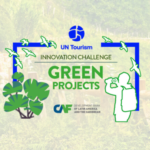New Business Models Emerge to Combat Deforestation in Peru as AJE Group Introduces Eco-Friendly BioAmayu Fruit Juice
Peru lost over 2,000 hectares of forest in 2020, the largest amount in two decades, and deforestation rates have worsened over time. In this context, private-sector-led initiatives are striving to create new business models that have a positive impact on climate and biodiversity, aligning environmental protection with economic competitiveness. As part of this effort, AJE Group has developed an Amazon-based fruit juice, BioAmayu, that aims to provide a uniquely eco-friendly consumer experience.
Reflecting Increased Corporate Focus on Environmentalism
BioAmayu was launched in 2018, before the COVID-19 pandemic offered a stark reminder of the need to reconcile mankind’s relationship with the natural world. Moreover, the protection of forests and restoration of degraded ecosystems is vital to mitigate global warming and safeguard the planet’s health. In recent years, AJE Group and other firms have redoubled their efforts to integrate environmentalism into their corporate culture and business models. In April 2022, AJE Group began the process of certifying BioAmayu as the world’s first climate-positive fruit juice.
A Model for Sustainability and Community Empowerment in the Amazon Rainforest
BioAmayu’s production methods support the conservation and sustainable use of 112,000 hectares of forest in the Peruvian Amazon, which sequester an estimated 400,000 tons of atmospheric C02. Fruit harvesting is conducted sustainably by Amazonian communities, which sell their produce directly to AJE Group, creating strong financial incentives to protect fruit trees, respect the cycles of nature, and manage forest resources responsibly. As a result, BioAmayu’s production contributes to healthier ecosystems with a more robust capacity to provide ecosystem services, including carbon capture. To date, more than 700,000 kilos of fruit have been purchased from Amazonian communities, benefitting more than 200 families in 24 Amazonian communities in Pacaya Samiria National Reserve, Manu National Park, National Reserve Pucacuro, and the Allpahuayo Mishana National Reserve.
As a member of the United Nations “Race to Zero” initiative since December 2021, AJE Group implements its corporate commitment to climate action consistently and transparently. Jorge López-Dóriga, Global Director of Communications and Sustainability for AJE Group, has emphasized the firm’s commitment to driving transformative change in the beverage industry, stating –
Jorge López-Dóriga, Global Director of Communications and Sustainability for AJE Group“We are proud to contribute to the achievement of the United Nations Sustainable Development Goals and the guidelines of the Paris Climate Agreement, through this emblematic drink, which we are sure already represents a new global standard in the industry.”
AJE Group Achieves Industry Leadership in Environmental Sustainability
Green Initiative Recognizes AJE Group as Global Champion for Climate Action and Biodiversity Protection, Encourages Acceleration of Net-Zero Emissions by 2050
At Green Initiative, we believe that AJE Group can become a global champion for climate action and the protection of biodiversity by continuing to integrating these values into its business model, as well as influencing its global value chains, in an attempt to accelerate their transition to net-zero emissions by 2050.








